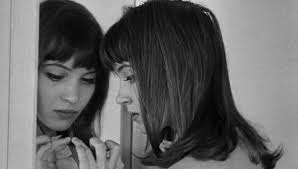STUDIO: Criterion | DIRECTOR: Jean-Luc Godard | CAST: Michel Subor, Anna Karina, Henri-Jacques Huet, Paul Beauvais, László Szabó
RELEASE DATE: 1/21/20 | PRICE: DVD $22.46, Blu-ray $27.99
BONUSES: 1965 interview with Godard; 1963 Michel Subor interview; 1961 audio interview with Godard
SPECS: NR | 88 min. | Foreign language drama | 1.37:1 widescreen | mono | Optional English subtitles
Viewers with only a casual knowledge of Jean-Luc Godard’s (Weekend, Breathless, La Chinoise) work will be familiar with only two aspects of this 1960 film (which has been out of print on DVD since a Fox Lorber release back in 2001). Firstly, that the film contained the feature film debut of Anna Karina (who died this past Dec. 14). Second and more prominently, the fact that the scene in which the lead reporter (Michel Subor) photographs Anna spawned the oft-quoted line, “Photography is truth and cinema is truth 24 times a second.”
Le Petit Soldat isn’t just the first time Godard showcased his first wife and first muse Karina. It is primarily a political thriller intended to reflect the conflicted feelings some Leftists had over the Algerian War. (These same feelings were explored by Gillo Pontecorvo in the much clearer and more critically lauded Battle of Algiers in 1966.)
Godard received criticism from all quarters for this, his second feature. Leftists condemned him for presenting a “reactionary” view of the fight for Algerian independence, while the French government banned the film outright until 1963 (when Godard’s masterwork Vivre Sa Vie, starring Karina, had already been released).
The plot is filled with rather odd twists. A reporter (Subor) for “the French News Agency” in Geneva has been persuaded by friends to join an anti-Algerian network of French spies. He joins the group but fails to kill a target they want eliminated. This leads the French agents to believe that he has betrayed them and exposes him to the Algerians, who abduct and torture him in an attempt to get information about the other side. All this occurs while our antihero realizes that he is madly in love with a Danish woman (Karina) who is working with the Algerian spies.
By today’s standards the torture scenes are relatively tame, but they do highlight a basic form of waterboarding — effectively “drowning” the subject by putting a t-shirt over his face and then spraying water onto the shirt until he can no longer breathe. This sequence shows how “homemade” methods of torture are as terrifying as more official methods.
One sees Godard forging his much-imitated visual and storytelling style here, from striking images of a city after dark (Alphaville) to the sudden announcement of the offscreen death of a major character (Masculin Feminin). Despite Soldat being a somewhat minor effort in his Sixties filmography, the film is still an important building block in his work.
The most interesting aspect in this regard is that, while the French and Algerian groups are both depicted as killers, only the pro-Algerian agents are shown torturing. As they do so, they read texts by Lenin and Mao — a far cry from Godard’s late Sixties films, in which his virtuous but neurotic heroes and heroines quote Mao and Marx freely.
Subor is a capable performer but he was not Belmondo or Jean-Pierre Leaud, so a scene near the end where he delivers a speech feels much too long. (His lament, about his generation “not having our own war,” was also quickly countered by the explosive events of the mid- to late-Sixties.) It also is a speech delivered to Karina’s character, who says not a single word in response — Godard’s best “couple” moments find both parties contributing something to the conversation.
Although the film could’ve quite easily existed without her character, Karina makes the film rewatchable, thanks to her youthful enthusiasm and the filmmaker’s wholly evident obsession with her. She went on to do excellent work with many other directors (among them Rivette, Visconti, Cukor, Ruiz, and Fassbinder), but her films with Godard were singular, groundbreaking, and eternally invigorating.
The three visual supplements included here provide a few details about the banning of the film, but mostly they focus on Godard’s filmmaking methods in the early Sixties. A short 1965 film segment finds Godard declaring Petit Soldat to be “no big deal” politically. He does note, though, that “certain Leftist publications” were furious at him for his depiction of the pro-Algerian agents.
He notes his reliance on film as a tool to understand the world, declaring that “Cinema led me to discover the lives of others.” He adds that by ’65 filmmaking had become for him “a window, not a mirror” to view society.
A 1963 interview with Subor shows him training in boxing at a gym and noting that Soldat is “not a political film” but about “a man caught up in a vicious spiral.” When asked about working with Godard, he notes that “he shoots as if he is writing a book,” in piecemeal fashion.
The best inclusion in the set, and the primary reason for Godard fans to acquire the disc — besides the excellent restoration done on the film — is a half-hour 1961 audio interview conducted in English for an American radio program. Godard had made three films by this point (Breathless, Soldat, Une femme est un femme), but host Gideon Bachmann notes that not even Breathless has gotten a general release at the time of the taping.
Godard provides some reflections on the goals of the New Wave and the shooting of Breathless, which took place over a three-week span during which “nothing was impossible.” Bachmann brings up the banning of Soldat, which Godard refers to simply as a “crime film.”
JLG also notes the increasing complexity of his film shoots, maintaining with both optimism and some wistfulness that “The dream is coming true, but I’m no more dreaming….”
|
Buy or Rent Le Petit Soldat
|
|---|

Leave a Reply